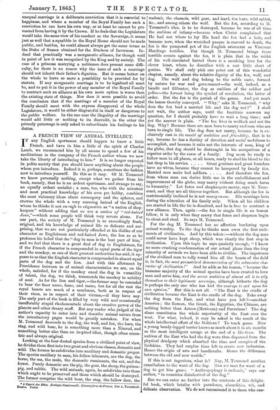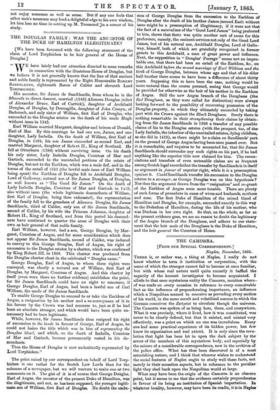A FRENCH VIEW OF ANIMAL INTELLECT.
IF any English sportsman should happen to know a little French, and have in him a little of the spirit of Charles Lamb, we recommend him by all means to spend a few of his meditations in the company of the French author whom we now take the liberty of introducing to him.* It is no longer expected in polite society that you should know anything about the people whom you introduce. Indeed it is, perhaps, sometimes the fashion now to introduce yourself. Be this as it may. Of M. Toussenel we know personally nothing, except what we gather from his book, namely, that he is an ardent sportsman, and strange to say, an equally ardent socialist ; a man, too, who with the minutest and most practical knowledge of his own pet hobby, combines the most visionary ideas about cosmogony and the spheres, and crowns the whole with a very amusing hatred of the English, whom he thinks it not enough to stigmatize as "a nation of shop- keepers" without adding that we are a nation of "red-haired Jews,"—which some people will think very severe abuse. For our part, the society of M. Toussenel is so exceedingly fresh, original, and his knowledge of animal life so delicate and sur- prising, that we are not particularly offended at his dislike of our character as Englishmen and red-haired Jews, the less so as he professes his belief that the " dog in man is the best part of him," and we feel that there is a great deal of dog in Englishmen, for if the French character is compounded in equal parts of the tiger and the monkey, as one of their greatest authorities has said, it ap- pears to us that the English character is compounded in almost equal parts of the dog and the lion. And with this allotment by Providence between us of animal characteristics we are, on the whole, satisfied, for if the monkey excel the dog in versatility of talent, the dog, we think, transcends the monkey in nobility of soul. As for the lion and tiger,—the former may be conceded to bear the finer name, fame, and mane, but for all the rest the royal beasts are much of a muchness, both as in respect of their vices, so in respect of their virtues,—if they have any. The early part of the book is filled by very wild and occasionally insufferably stupid rhodomontade about the creative power of the planets and other dreary stuff. But any reader who judged of the author's capacity to enter into and describe animal nature from the introductory pages would be greatly mistaken. For when M. Toussenel descends to the dog, the wolf, and fox, the hare, the stag, and wild boar, he is something more than a Nimrod, and something better also than an inspired idiot, though often eccen- tric and always original.
Looking at the four-footed species from a civilized point of view, he divides them first into two great and obvious classes, domestic and wild. The former he subdivides into auxiliary and domestic proper. The species auxiliary to man, his fellow-labourers, are the dog, the horse, the ass, the mule, the domestic ruminants, the cat, and the -ferret. Purely domestic are the pig, the goat, the sheep, the guinea- pig, and rabbit. The wild animals, again, he subdivides into those which ought to be preserved and those which should be destroyed. The former comprise the wild boar, the stag, the fallow deer, the
* EBsprit &a Beta. Zook,* Pattie:mak. Minim:Tem de France. Par A. Tozusaerial. Vesta. Paris. roebuck, the chamois, wild goat, and isard, the hare, wild rabbit, &c., and among others the wolf. But the fox, according to M. Toussenel's idea, is to be destroyed, because he was of all time the emblem of infamy—because when Christ complained that He had not where to lay His head the fox had a hole, and because now, when the wretched pauper is starved to death, the fox is the pampered pet of the English aristocrat as Viscount Hardinge testifies. But though M. Toussenel brings these terrible counts against the fox, it is plain that in the midst of his well-simulated hatred there is a sneaking love for the clever beast, whom he describes with a zest little short of genius. We shall only pick one point out of this wonderful chapter, namely, about the relative dignity of the fox, wolf, and dog. The wolf and dog belong to the noble caste, formed by nature for war and government—the wolf, indeed, as a bandit and filibuster, the dog as emblem of the soldier and police—the former being the symbol of revolution, the latter of order. But the fox is the pariah of the genus. And yet mark the lesson thereby conveyed. " Why," asks M. Toussenel, " why does the fox lead a married life and the dog not?" I shall not wait, the author says, until the Institute answers my question, for I should probably have to wait a long time ; and yet the answer is plain. "The fox lives in wedlock and not the dog. Why? Because there are men born to marry and men who are born to single life. The dog does not marry, because he is ex- clusively cast in the mould of ambition and friendship, that is to say, because he has a destiny of devotion and social usefulness to accomplish, and because it suits not the interests of man, king of the globe, that dog should be distraught in his occupations of a superior order by the cares of a family. Dog must be ready to follow man in all places, at all hours, ready to shed his blood to the
last drop in his service Great geniuses and great founders have no wives, because they cannot be hampered by family ties.
Married men make bad soldiers And therefore the fox, from whom man can derive little use in the embellishment and improvement of the globe, may marry without doing much harm to humanity." Let foxes and shopkeepers marry, says M. Tous- senel, and they are all thieves together. But although the fox is matrimonially inclined he is not monogamous. His marriage lasts during the education of his family only. When all his children are started in life the tie is dissolved, and he is free to contract a new alliance. Then, again :—the fox in single life is an honest fellow, it is only when they marry that foxes and shopmen begin to cheat and steal. So says M. Toussenel.
For the dog M. Toussenel has an affection bordering upon animal worship. To the dog he thinks man owes the first rudi- ments of civilization. And by this token :—without the dog span could never have kept sheep, which was clearly the first step in civilization. Upon this topic he says quaintly enough, " I know no more crushing condemnation of our actual phase than the tiny minority of animals we have been able to Civilize. The impotence of the civilized man to rally round him all the beasts of the field is, in fact, the most geometrical demonstration of the subversive cha- racter of civilization !" And he adds as his reason, " because the immense majority of the animal species have been created to love man and serve him, and the secret ambition of almost all is to ally themselves to their legitimate sovereign, although hitherto the dog is perhaps the only one who has had the courage to act upon his own opinion." But this is not all. " The East is the cradle of civilization because the East is the cradle of the dog. Take away the dog from the East, and what have you left ?—another America ; the Roman, the Greek, the Egyptian, the Chinese, are nothing better than Aztecs (Mexicans) and Peruvians ! The dog alone constitutes the whole superiority of the East over the
west. For what, indeed, it may be asked is the result of the whole intellectual effort of the Mohican ? To track game. Now a young bandy-legged terrier knows as much about it in six months as the most intelligent savage at the end of a life-time. The natives of the East who had the dog were thus dispensed from the
physical drudgery which absorbed the time and energies of the Redskins. They had surplus time left to create new industries. Hence the origin of arts and handicrafts. Hence the difference between the old and new worlds."
If this is not ingenious, what is? Nay, M. Toussenel ascribes cannibalism to the want of the dog. Man ate man for want of a dog to get him game. " Anthropophagy is endemic," says our author, " in countries disinherited of the dog."
But we can enter no further into the contents of this delight- ful book, which bristles with paradoxes, absurdities, wit, and delicate observation. We do not recommend it to those who can-
not enjoy nonsense as well as sense. But if any one feels that other men's nonsense may lend a delightful edge to his own wisdom, let him lose no time in setting up M. Toussenel ',in a corner of his study.





































 Previous page
Previous page